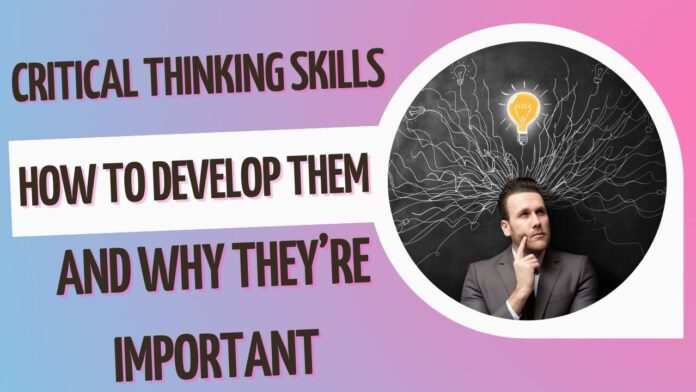Critical thinking is an important skill to have in today’s fast-paced world. It provides you with the ability to understand complex problems. In almost every field of study, students must use critical thinking skills to do assignments or solve papers. It is used to analyse information and interpret relative and effective solutions. If you have strong critical thinking skills, you can handle any situation. No matter what problem you face while studying, you will be able to solve it with critical thinking. Some students do not know how to apply it in their assessments or study. If you are one of the students struggling with this issue, then you are at the right place. This article includes some important steps you must follow to develop critical thinking. In this article, you will learn how to develop critical thinking skills and why it is important in your everyday aspect of life.
Improve Your Studying By Developing Critical Thinking Skills:
Critical thinking is the key to success. It includes steps like collecting and analysing information, asking questions about it, and then analysing possible solutions. If you want to become a successful critical thinker, there are a few skills you will need to develop. Let’s discuss the steps in detail.
Identify the problem or situation:
You need to identify what kind of problem it is and its perspectives. If the problem is bigger, try narrowing down your problem statement. This way, you will understand the nature of the problem in-depth and what kind of data you need. When you are done sorting your problem statement, you can identify bias and errors in thinking. It involves being able to spot when someone is giving false information or using flawed logic. You can also hire the best writers from a reliable firm like Dissertation Writers UK in this regard.
Think Creatively to Collect Data:
Second, you need to be able to think creatively. It means coming up with new ideas and seeing problems from different perspectives. When you understand the problem, it will be easy to collect comparative data and information. You will have to see whether the data is accurate or not. Think critically about whether the data or information you are collecting is relative to your problem or not. Identify what kind of opinions and argumentative statements you need to search for.
Analyse and Evaluate The Data:
In this step, you need to analyse your data to see whether the data is credible and is supporting the relevant points properly with relevant resources to support the argument. Is the information more than enough to test the validity of the hypothesis?
Organise The Data:
In this step, you need to sort out your findings. The data you collected needs to be ordered, and you need to classify your data. Organise the opinions, claims and supporting evidence so you would input them into your paper when needed.
Develop the Solution:
In this step, you need to think about the solution to the problem by processing all the facts and information. Evaluate the possible solutions by thinking critically about whether they support your claim and have supporting points so that the reader will see your solution’s accuracy and validity. You do not need to prove someone wrong in your solution. Rather it would help if you convinced your target audience with your thoughts on why you are right.
Test the Solutions:
In this step, you must test the possible solutions you developed to solve your problem statement in the previous step. Consider all the solutions, and check which one is more accurate and effective. See the strength and limitations of all possible conclusions. Do not be biased in your answers. Decide the solution that provides sufficient supported arguments to solve the problem.
Present Your Conclusion Effectively:
You need to present your findings to the stakeholders or the readers in a concise manner. It would be best if you make convincing statements when displaying your solution. Try to give the significance of the solution you provided at the end.
Why Are They Important?
Critical thinking skills are important for several reasons. Let’s go through all the reasons that prove critical thinking is best for solving issues.
Strong Decision-Making Power:
First, they allow us to make better decisions. When you think critically, you can look at all the information available and make choices based on logic and reason rather than emotion or impulse.
Provide Effective Solution to the Community:
Critical thinking skills help you to solve problems more effectively. If you can think through a problem and identify all the potential solutions, you will likely find the best one.
Good Communication Skills:
It also helps to improve your communication skills. When you articulate your thoughts and support your ideas with evidence, you will be more persuasive about your point of view.
Prove Yourself Smart:
Considering the main points of critical thinking, you can say they are important because they make you smarter decision-makers. They help you to solve problems more efficiently with accurate facts. If you want to be successful in any area of life, you must learn to think critically.
Increase Critical Thinking Power:
It also helps you to think more logically. You can see both sides of an argument and make a reasoned decision when you have strong critical thinking skills. You can see the implications of your actions and understand the consequences of your decisions. Strong critical thinking skills can help you in all aspects of your life, from personal relationships to professional success.
Conclusion:
In this article, you will learn why critical thinking skills are necessary for solving everyday life problems and your study field. You can easily provide effective solutions to the toughest situations or problems. People today are more likely to accept an authentic, unique, and valid solution than hearsay. You can reach amazing results through critical thinking skills in convincing the readers about your solutions. Best of Luck!

















